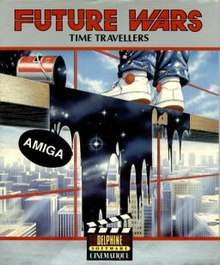Future Wars
Future Wars, subtitled in Europe as Time Travellers and in North America as Adventures in Time and known in France as Time Travelers: The Menace (French: Les Voyageurs du Temps: La Menace) is an adventure game from Delphine Software International, released in 1989. The game is mainly the work of Paul Cuisset (story and programming) and Éric Chahi (graphics). The game was supposed to be the first of a series of adventure games revolving around time traveling but later episodes were never made.
| Future Wars | |
|---|---|
 European cover art | |
| Developer(s) | Delphine Software |
| Publisher(s) | Delphine Software |
| Designer(s) | Paul Cuisset |
| Artist(s) | Eric Chahi |
| Composer(s) | Jean Baudlot |
| Engine | Cinematique[1] |
| Platform(s) | MS-DOS, Amiga, Atari ST, NEC PC-9801, Sharp X68000 |
| Release | 1989 |
| Genre(s) | Point-and-click adventure |
| Mode(s) | Single-player |
Gameplay
Future Wars is played by left-clicking for character movement, and right-clicking for character actions. The actions available in the right-click popup menu are: Operate, Examine, Take, Use and Inventory. "Use" had a subcategory which enabled the player to drag and select the items in their inventory.
Plot
The player starts the game as a window cleaner dressed in white overalls who is in the middle of cleaning the outside of a skyscraper. According to later references, the game starts in 1989 (also when Future Wars was first retailed).
The player character is not given a name throughout the game. The game cursor identifies him only as 'hero'. He is standing on an electric elevator platform attached to the exterior of the building when 'Ed the boss' opens a window to reprimand him for slacking by banging his fist against the window ledge and shouting. The player then can enter the building and, while playing a prank on Ed, he discovers a secret passage leading to a machine room. There he acquires some documents in an alien language which he keeps in the inventory.
The device takes the player to the year 1304, where the hero has the chance to rescue a damsel in distress from dubious monks. He learns then that she is Lo'Ann, a time traveler who came with her father Lear to thwart an alien plot to plant a long-delay time bomb, and he helped them to succeed in their mission against the Crughons. However, by learning things he shouldn't, he must be taken to the Supreme Council of the future so that his fate is decided.
The player is then taken to forty-fourth century to meet the council during an attack by the Crughons. After a minor mishap and subsequently having to make his way through the ravaged city of Paris II, the hero eventually gets aboard a shuttle that would take him to the council's city, only to be kidnapped by the Crughons. He is rescued by Earth forces but he is accused of collaboration with them as he is carrying the Crughon documents with him; he is only saved from execution by Lo'Ann who informs the Council.
The Council then explains to the player the history: The humans had abandoned Earth and were living in colonies when the war with the Crughons erupted a century ago. The war pushed them to rehabilitate the abandoned Earth. They built a 'time-space energy shield' system called S.D.I. 'in memory of the past' which prevents the Crughons both from attacking Earth and also teleport themselves through time-travel. However, the Crughons managed to visit Earth in different periods of the past and plant three time bombs in the location of the future three generators of S.D.I. Once activated, the bombs can't be defused and the only option is to prevent the Crughons from planting them. For now, Lo'Ann managed to defuse one of them with the hero's help in the Middle Ages, however the one from the hero's era detonated, allowing the Crughons to attack. Thanks to the documents the hero was carrying, they determined that the third bomb was planted in the Cretaceous period.
He and Lo'Ann then travel there to foil the Crughon's attempt. After an arcade sequence and the wounding of Lo'Ann, the hero boards their spacecraft and travels to their headquarters to detonate the bomb prematurely. The game ends when, after succeeding in detonating the bomb long before hominids even evolve (and providing an alternate explanation for the Cretaceous–Paleogene extinction event), the hero returns to the forty-fourth century to fight further battles against the Crughons.
Reception
| Reception | ||||||||||||
|---|---|---|---|---|---|---|---|---|---|---|---|---|
| ||||||||||||
Upon release, Future Wars received positive reviews.[6]
Computer Gaming World's Allen Greenberg praised the game's story as good, its graphics as "very imaginative and at times absolutely striking" and its musical score as "a respectable soundtrack which many will consider superior to most of those composed and released for theatrical films" but stated the same graphical detail was frequently hiding important objects vital to solving the game and hindering the player's movement in certain cases. It also criticized the Cinematique engine as "not quite the innovation Future War's designers claim it to be—similar features have appeared in games by Sierra as well as Lucasfilm."[7]
References
- "Cine - ScummVM :: Wiki". wiki.scummvm.org.
- Green (December 1989). "Time Traveller: Future Wars / He digs deepest who deepest digs". Amiga Computing. No. 19. Database Publications. p. 36. Retrieved 2017-08-06.
- Walkland, Nick (January 1990). "Future Wars". Amiga Format. No. 6. p. 67.
- Patterson, Mark (December 1989). "Future Wars". CU Amiga. EMAP. pp. 46–47.
- "Future Wars: Time Travellers". Zzap!64. No. 58. Newsfield. February 1990. pp. 23–25.
- "Future Wars". Amiga Reviews. Archived from the original on 2008-01-31. Retrieved 2017-08-06.
- Greenberg, Allen L. (September 1990). "Interplay's Future Wars / The Transportation System at the End of the Universe". Computer Gaming World. No. 74. pp. 35, 59. Retrieved 2017-08-06.